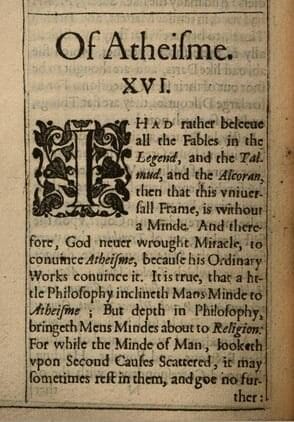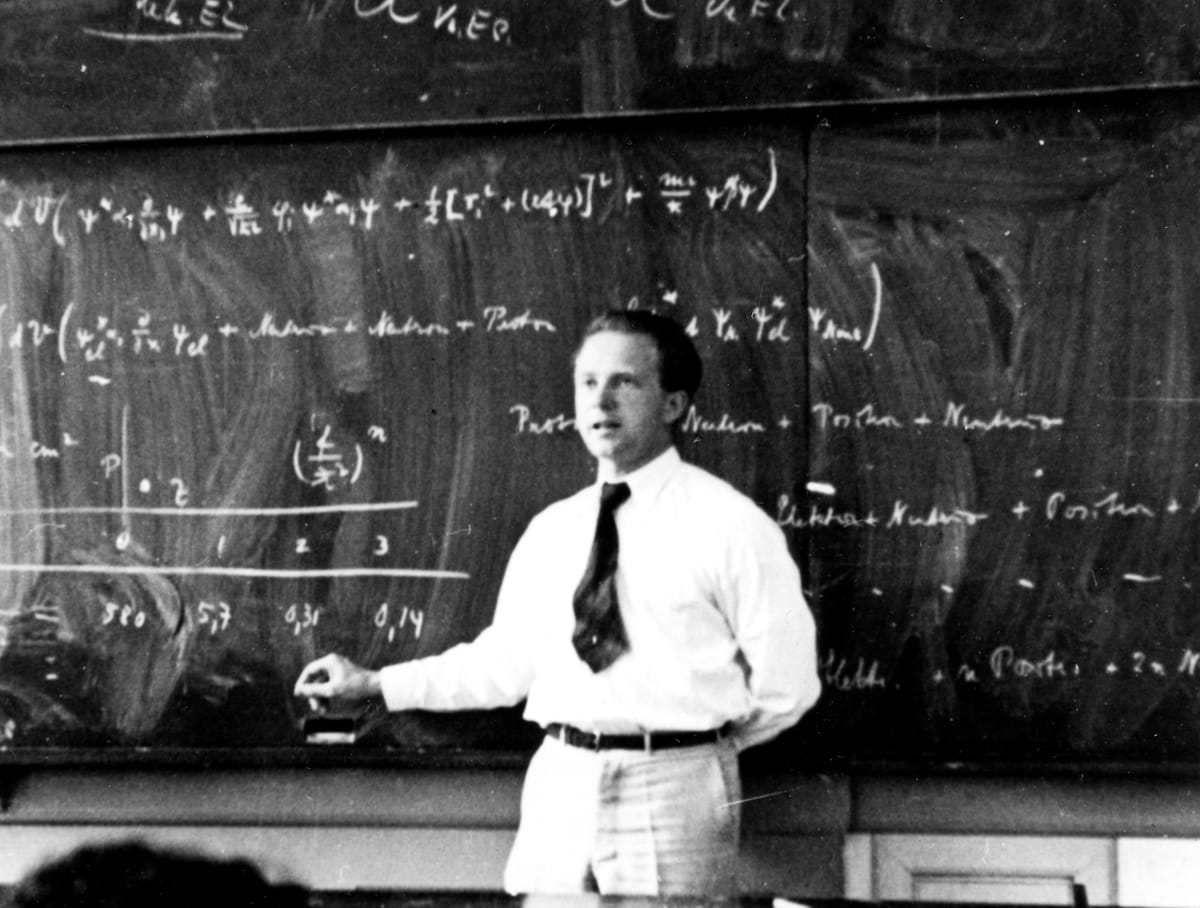On the Internet you can find a polemical aphorism attributed to one of the creators of quantum mechanics. We have verified the correctness of this attribution.
A quote attributed to a Nobel laureate in physics reflects the view many large scientistswho simultaneously believe in God and the theory of evolution. Quote loves drive in her lectures and interviews, neurolinguist and popularizer of science Tatyana Chernigovskaya. The phrase occurs in various books on religious and semi-religious topics, network meetings aphorisms, as well as on social networks: Facebook (there are publications from 580, 535 And 506 reposts at the time of writing this analysis), "VKontakte"(340 reposts) and X (187). Sometimes, instead of a glass, a vessel or bowl appears in the translation.
The advent of quantum mechanics brought the relationship between science and religion to a new level. Its key concepts: uncertainty principle, quantum entanglement And observer effect - have given rise to many interpretations that sometimes go beyond the bounds of strict science and intersect with metaphysical or even religious ideas. A trend has emerged such as quantum mysticism, which is not supported by most modern scientists.
The two pillars of quantum mechanics were also interested in religion and even Eastern mystical practices - Erwin Schrödinger And Werner Heisenberg. The fact that Heisenberg, a native of Lutheran family, believed in God, there is no doubt. How told The physicist Henry Margenau, who met Heisenberg after World War II, was struck by his colleague with his deep religious conviction: “He was a true Christian in every sense of the word.”
One can also conclude from his works that Heisenberg has a special relationship with God. In the essay "Reality and its order"(1942) he wrote:
“...Discussion of the eternal question of the existence of God. In search of an answer to this question, human thought has gone through many stages, each of which is necessary to achieve the next. The first step we could simply say: "I believe in God the Father, the almighty creator of heaven and earth." The next step - at least for our modern consciousness - was doubt. There is no God; there is only an impersonal law that governs the destinies of the world in accordance with cause-and-effect relationships. <…> The next step, perhaps, would be Voltaire’s frivolous formula: “If there were no God, someone would have to invent him.” That is, belief in a personal God is, at least, a useful, acceptable self-deception, a self-deception that contributes to the harmony of our soul. <...> It is quite possible that all the great parables: about a personal God, about the resurrection of the dead, about the transmigration of souls - are real as long as people have the strength to believe in them. But then, shouldn't we abandon such a subjective reality, which has seemed unstable for centuries, and limit ourselves to that area of reality that can be objectified and will undoubtedly survive millennia? It seems that this is precisely the position that many people are striving to take today. But this position is also based on an illusion: the assumption that we can avoid changing our world through the power of our soul. <…> Today we can no longer say with childish confidence: “I believe in God the Father, the almighty creator of heaven and earth.” And yet we can with full confidence entrust ourselves into the hands of a higher power, which during our lifetime and throughout the centuries determines our faith, and with it our world and our destiny. <…> The question of the existence of God has long ceased to be scientific; it’s a question of what we should do.”
In other words, the German physicist translates the question of the existence of God into an ethical plane, without in any way refuting it and generalizing it to a higher power. Heisenberg carried this attitude throughout his life. In 1973, three years before his death, in a lecture entitled “Tradition in science"he spoke from the position deism:
“Galileo argued that nature, the second book of God, is written in mathematical letters <…>. Kepler expresses himself even more clearly in his work on world harmony; he says: God created the world in accordance with his ideas of creation. These ideas are pure archetypal forms, which Plato called ideas, and they can be comprehended by man as mathematical constructs. They can be comprehended by man because man was created in the spiritual image of God. Physics is a meditation on the divine ideas of creation, therefore physics is a divine service.”
He developed his idea in one of articles a year later:
“As you know, in the history of science, starting with the famous trial of Galileo, it has been repeatedly asserted that scientific truth is incompatible with the religious interpretation of the world. Although I am convinced that scientific truth is undeniable in its own field, I have never considered it possible to dismiss the content of religious thinking as simply part of an outdated stage in the consciousness of mankind, as a part which we will have to abandon in the future. Therefore, during the course of my life, I have repeatedly been forced to reflect on the relationship of these two areas of thought, for I have never been able to doubt the reality of what they point to.”
Thus, Heisenberg recognized the existence of both physical laws and God, the Creator, responsible for their appearance. In the last quote, you should pay attention to the phrase “I could never doubt the reality...”, which is somewhat dissonant with the statement that became the topic of this analysis - it talks about turning to atheism and returning to religion.
“Checked” did not find any statements similar to the one we were looking for in Werner Heisenberg’s books, published in different languages and accessible through projects Internet Archive And "Google Books" It is not in Heisenberg's seminal work on this topic."Physics and philosophy: revolution in modern science"(1958), as well as in the work of Herbert Hertz"Werner Heisenberg and philosophy"(1966). The aphorism is not found in correspondence Heisenberg, as well as in some biographical works about him. In 2015 in discussion on the website de.wikiquote.org a certain user introduced himself Eike by Christian Hirsch, Heisenberg's interviewer and friend of his children, said that the quote does not correspond to the views and vocabulary of the physicist and is refuted by Heisenberg's heirs. However, the authorship of this commentary seems doubtful: in it, 78-year-old Hirsch is mentioned, among other things, in the third person, and the rhetoric in relation to religion does not quite correspond to the status of a doctor of theology.
At the same time, it cannot be said that in the 20th century this quote (in the original - “Der erste Trunk aus dem Becher der Naturwissenschaft macht atheistisch, aber auf dem Grund des Bechers wartet Gott”) with attribution to Heisenberg was popular. Found in open sources only some cases, one of the oldest - a book by a journalist published in 1979 Heinz Otręba about the history of Würzburg, Heisenberg's hometown. In the same year the statement mentioned creation biologist Wolfgang Kuhn in his book The Squirrel and the Lord. How found out Another biologist, Günter Bächli, Otremba borrowed a quote from the work of Louise Rinser "Suffering - death - resurrection"(1975). “Verified” made sure that this quote was mentioned by Rinzer with reference to Heisenberg, but without indicating the source.
But a version of the phrase, slightly different from the viral one, can be found in the work of the German physicist and philosopher Karl Friedrich von Weizsäcker “History of nature"(1948), containing his lectures from two years ago:
“There is no fair way back from reflection to naive faith. According to the old saying, the first sip from the cup of knowledge separates us from God, but at the bottom of the cup God waits for the one who seeks him. If this is so, then there is a way of thinking that leads to religious truths, and only this path bears fruit. If this is not so, our world is placing its hopes in religion in vain.”
As we see, here Weizsäcker calls the statement an old proverb and doubts its truth. As a quote from Weizsäcker it featured in a number of publications before it began to be attributed to Heisenberg. And this transition does not seem to be accidental, because during his scientific career Weizsäcker was protégé Heisenberg, his colleague in the German nuclear program and friend for almost half a century. Perhaps a misunderstanding of a certain paragraph in which both physicists and this quote were mentioned led to such an error. Günter Bächli also admits another option: Louise Rinser, according to her biography, communicated both with Heisenberg and with Weizsäcker, and she simply could have confused which of her colleagues, very similar in outlook, she heard the aphorism from.
Weizsäcker’s version, despite its status as an old saying, is first found in open sources in his work. But this phrase undoubtedly had prototypes. In his essay “On Atheism” (1625), the English philosopher Francis Bacon wrote: “It is true that a little philosophy inclines the human mind towards atheism, but the depth of philosophy directs the human mind towards religion.”

Bacon's statement was not always conveyed verbatim. So, at the beginning of the 19th century it was already quoted as "A little knowledge makes men atheists, but a deeper acquaintance with the sciences brings them back to religion." Modified version healed his life and, apparently, reached Karl Weizsäcker with a metaphor about the cup of knowledge. Here too you can see the British mark. In 1711, in the poem “Experience about criticism» poet Alexander Pope wrote:
“And half-knowledge conceals a lie within itself;
Revel in the stream of pierid:
One sip will intoxicate your mind,
If you drink a lot, you’ll be sober again.”(translated by A. Subbotin)
However, metaphor the first sip from the cup of knowledge is also found in German-language religious literature in the 19th century, and from a certain point the cup of knowledge began contrast religiosity, so that the aphorism cited by Weizsäcker became a hybrid of several ideas.
Thus, the quote about cognition attributed to Werner Heisenberg does not appear in his writings and, apparently, was attributed to him by mistake. The author of a similar statement was Heisenberg’s friend and colleague Karl Weizsäcker, and the prototype of the aphorism can be found in the works of Francis Bacon.
Cover photo: AIP Emilio Segrè Visual Archives
Read on topic:
- Is it true that the student who argued with his professor about God was Albert Einstein?
- Did Einstein say that compound interest is the eighth wonder of the world?
- Is it true that the famous physicist Niels Bohr was the goalkeeper of the Danish national football team?
If you find a spelling or grammatical error, please let us know by highlighting the error text and clicking Ctrl+Enter.






